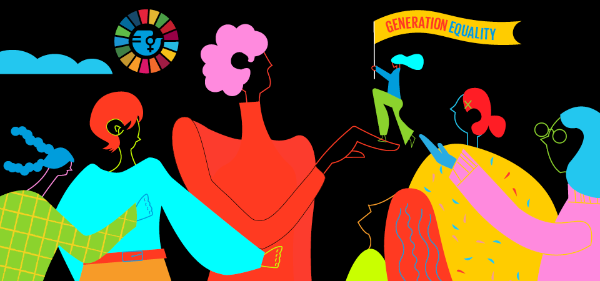Featured Photo Credit: UN Women/Yijiu Yuan
by Charlie Estes, Intern for The Hunger Project
March 8, 2021 —
International Women’s Day is a time to take stock of where we are in our global journey toward gender equality and look forward to what’s to come.
According to the World Economic Forum’s 2020 Global Gender Report, it will take 99.5 years to close the overall global gender gap. A girl born today has the possibility to see gender parity in her lifetime, but improvement is slow. Since 2015, progress toward gender parity has been minimal. On a scale from zero (no gender equality) to one (full gender equality), the global Gender Parity Score has gone from .60 to .61– an increase of 1.67% in five years.
The Covid-19 pandemic has not helped. Domestic violence against women has spiked due to women being forced to quarantine with their abusers, when even before the pandemic, 1 in 3 women experienced physical or sexual violence. Health and social care workers (of which women make up 70% globally) have been hit hard by exposure to the virus, with infection rates among female health-care workers 3 times higher than that among their male counterparts.
The Covid-19 pandemic has taken its toll on women economically as well. Female job loss rates are about 1.8 times higher than male, with women making up 39 percent of global employment but 54 percent of job losses during the pandemic. The 740 million women who work in the informal economy saw their incomes fall by 60% during only the first month of the pandemic. Closures of schools and daycare centers have driven many women back into the home to care for their children, while others have to navigate the difficult balance between their jobs and their increased household responsibilities.
The WHO declared the global Covid-19 pandemic almost exactly a year ago, and as we start to reign in the virus with the vaccine, it is time to address what the UN has called the “shadow pandemic” of women’s inequality. As economies rebuild and re-emerge from the crisis of the pandemic, programs and policies in every country must target the needs of women. The UN Women report “Gender Equality in the Wake of Covid-19” lays out these important policy priorities:
- Protect women’s health and well-beiing, including ensuring access to sexual and reproductive health services
- Introduce economic support packages for vulnerable women and measures to confront women’s increasing time and income poverty
- Address the pandemic’s economic impacts and the devastation of jobs and livelihoods.
- Close glaring gaps in social protection
- Prioritize prevention and redress of violence against women and girls in COVID-19 responses and ensure that services for survivors are deemed essential and remain accessible and adequately funded.
- Improve gender data collection and expand research on the gendered impacts of COVID-19, particularly on those most marginalized
Following these principles for rebuilding following the pandemic, we can address the devastating effects of the pandemic on women and soon be back on track toward reaching gender parity across the world.


